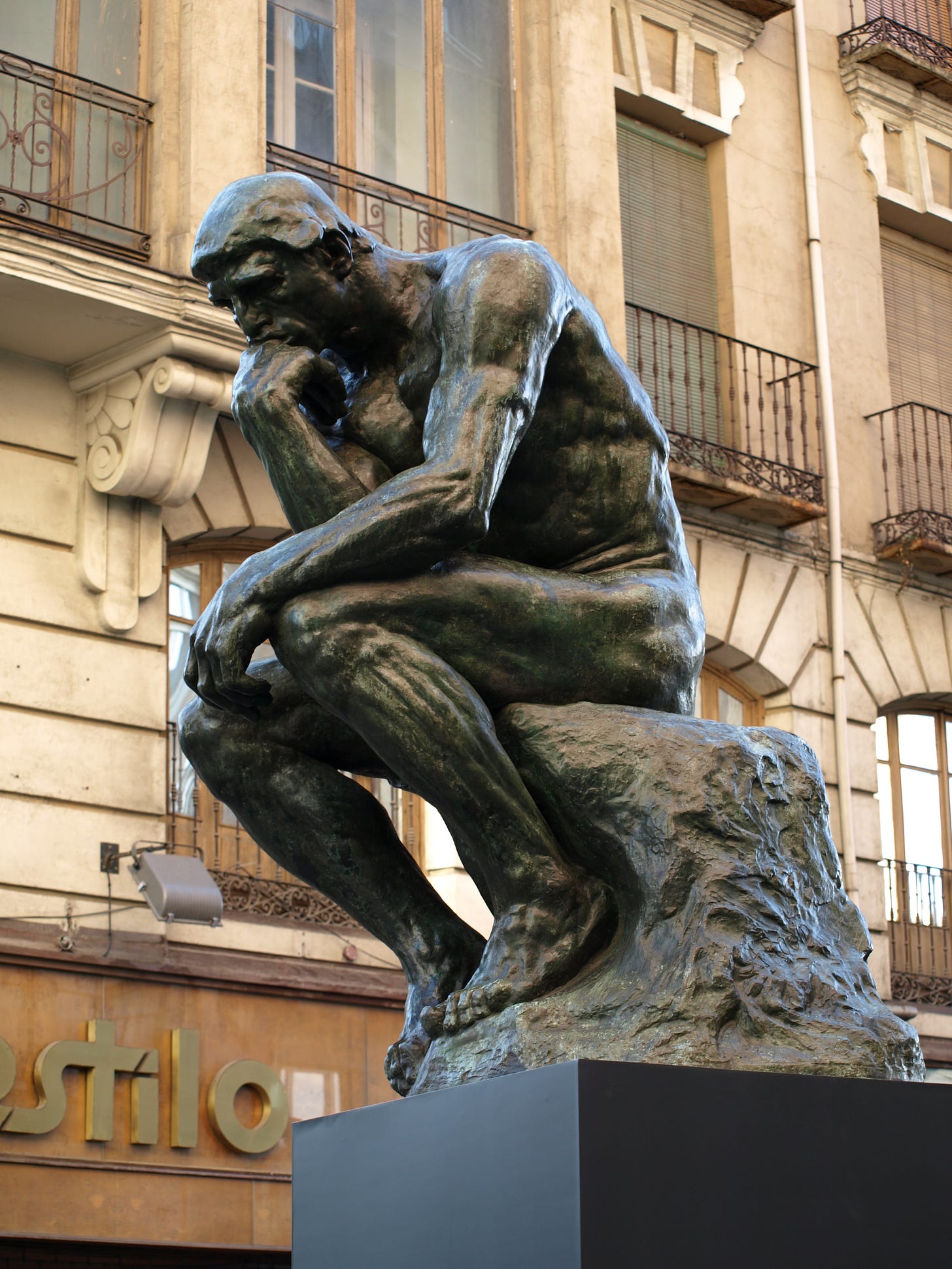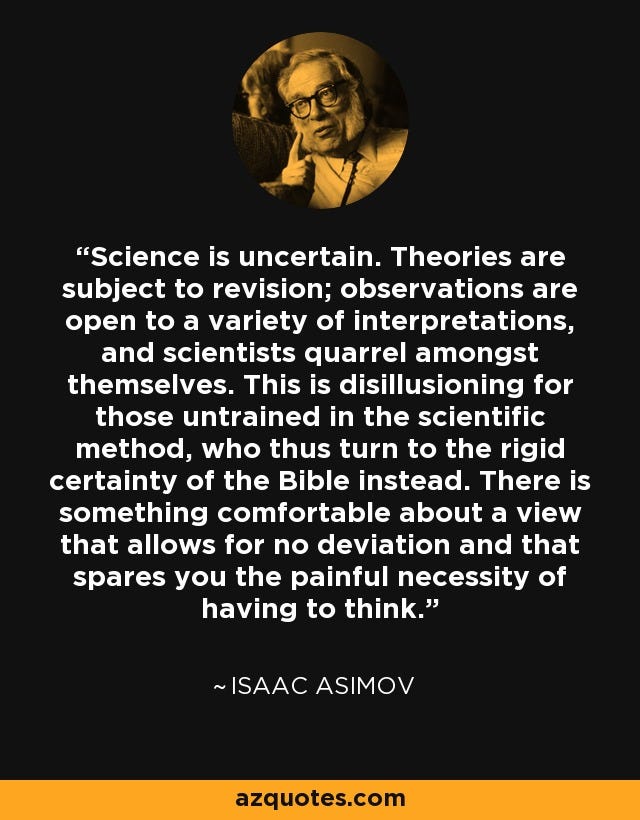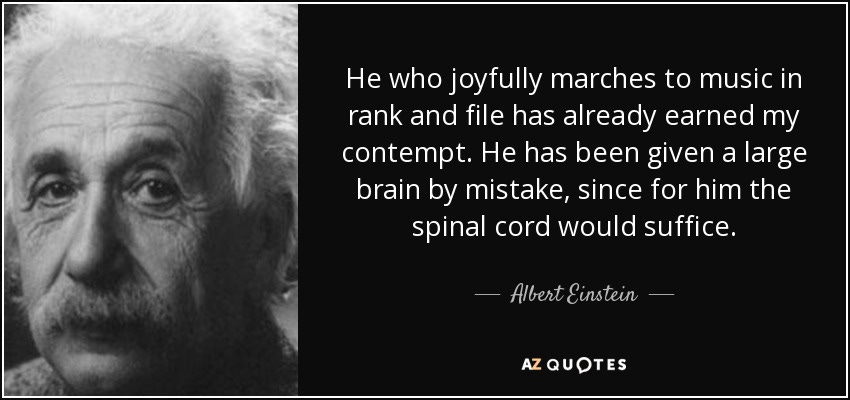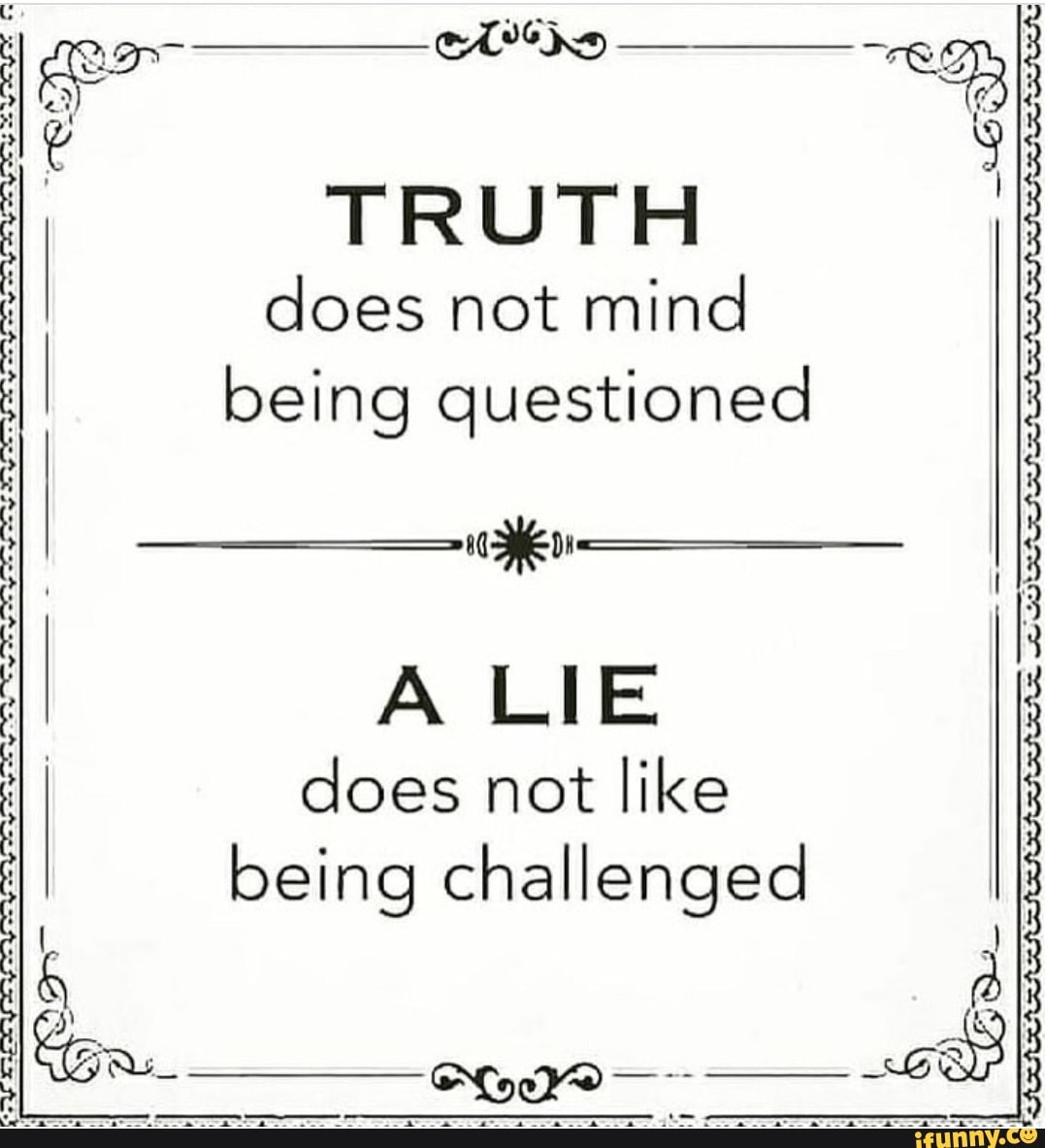I Will Never Apologize for Being a Skeptic (Part II)
How to turn your skepticism to eleven, and how to be a skeptic in a hostile society.

Being a skeptic does not mean dismissing things out of hand, or being a “denier”.
It means being a critical thinker.
It means following the dictum “Accept nothing as true, no matter who said it, unless it agrees with your senses and your reasoning mind.”
Every institution (particularly every large institution) wants your assent and your compliance.
It’s simple. Do not automatically give it. Question them.
A Skeptic’s Attitude Toward the Media
Being a skeptic means not taking “information” at face value.
How we ingest information matters.
There’s a widespread assumption that “information” is always true, that “facts are facts” and no one can alter them. (And, somewhat absurdly, that there exist these mythical beings called “fact-checkers” who verify them.)
Why would “the news” ever lie? It’s just presenting us “the facts”, right?
But, as we all know, so-called “facts” can be misrepresented, mismeasured, misinterpreted, overemphasized, underemphasized, misunderstood, manipulated, misdefined, mischaracterized (often using emotionalized language, e.g., “an explosion of cases!”), suppressed, censored, lied about, propagandized, politicized, fearmongered, etc.
The way in which information is presented matters, especially whether it serves someone’s interests or not.
This is reason enough for media skepticism.
It’s not enough to hear “information” and merely accept it at face value. We must also question why the information is presented to us in the way it is, and whether it represent an attempt at manipulation, and whose interest does it serve to do the manipulating?
There are three filters, at minimum, you should apply to any piece of information you hear: money, power, and politics.
So, you hear some piece of news (or see something tweeted or emphasized in your feed) you should immediately ask:
1. Does someone profit from me blindly accepting this? (Money)
2. Does someone gain leverage over me (or anyone) if I blindly accept this? (Power)
3. Does this advance someone’s political agenda if I blindly accept this? (Politics)
These three things filter out and explain about 90% of so-called “world events”. We often think the world seems “crazy”, but by eliminating this 90%, I believe, we eliminate much of the insanity and hysteria and what remains makes much more sense.
Notice, these agenda filters must be applied not only to the information, but also to the source of information, e.g., the social media algorithms or news broadcasts that bring it to your attention in the first place.
Ask yourself: what does the purveyor of this information want me to do? Do they want me act or behave differently, and is it a manipulation or an attempt at behavior control? What does the purveyor stand to gain if I and everyone else I know modify our behavior in the way they want?
Now, if you’re a functioning human at all, you must already exercise a degree of media skepticism. If every news report meant that you had to feel what the news wanted you to feel, you would be in a state of paralyzing, unending panic. (I think we all know people who are close to this).
Some small, sane, skeptical part of your mind must be saying: “Okay, I’m not surrendering to blind, unreasoning fear on this particular point.”
Fear, in particular, is a dead giveaway. If someone wants you to fear something, it should set off your skeptical alarm bells. Chances are they are not the least interested in “informing” you. They know you will find it irresistible and consume it, for one. (They call it “fear porn” for a reason). But more importantly, they know it will modify your behavior, i.e., make you more compliant to whatever it is they want you to do.
When did media skepticism become a bad thing? When the media, or whoever controls it, wanted you to accept something without questioning it. That’s when.
I want to circle back to “misdefined”, for a moment.
Notice how “information” can even be manipulated simply by modifying word meanings. I’ve often wondered if this entire two years has been a “pandemic of definitions”.
Even the word “pandemic” itself was subtly redefined to serve someone’s interests. Thus we have “pandemic” with no widespread mortality and no defined end point, “cases” with no symptoms and no live infection (or even a diagnosis), “deaths from” instead of “deaths with”.
Whenever I hear someone say: “When the pandemic hit…” I want to correct them: “You mean, when normal life was redefined as an “emergency”?”
A Skeptic’s Attitude Toward Science
A corollary of the assumption that information is always true, is the assumption: “If a scientist said it, it must be true.”
But of course scientists are humans. Which means they are just as subject to biased, misleading, misunderstood, wrong-headed, politicized, interest-serving thinking as anyone else.
Many, many scientific papers are later retracted. How could this be if scientists are “always right”?
Scientists also disagree about things. Scientists criticizing one another’s work is how science is done. How can this be if every single scientist is automatically right?
The reason we value science as highly as we do is not because “science always gets it right.” It’s because it’s subject to criticism by one’s peers, and by the public, and by basic logic.
In other words, skepticism, inquiry, is built into the scientific process.
There are no “sacred truths” in science. Just the opposite. Scientific theories are subject to analysis, criticism, reinterpretation, and overturning, by anyone, forever. The truths that science uncovers are understood to be “current best explanations until falsified”, and that’s it.
This is why we value science as an enterprise as highly as we do: because (ideally) it continually tries to prove itself wrong and come up with better explanations.
We already have a name for certain, true knowledge for all time, set in stone so it can never be questioned or challenged, and can only be pronounced so by a qualified authority: it’s called religion.
Skepticism in a Nutshell
Activating your skepticism, as I see it, really means developing these three mental disciplines:
1) Disidentify (in other words, don’t think as something, i.e., drop the labels (especially political ones) and tribes, and just be a freethinker);
2) Question (in other words, be a critical thinker, bring the full force of your questioning mind to bear on something);
and…
3) Think for Yourself (in other words, don’t simply assent to something because someone you like/trust/revere says so, unless it makes sense to your reasoning mind).
Hmm, there’s a name for a blog in there somewhere …
How to Be A Skeptic in a Hysterical (and Hostile) Society
Information is Power. Think For Yourself. CAUTION: proper use of the brain is not endorsed by federal governments nor huge corporations involved in serious financial profit from a brainwashed and enslaved population. Mild discomfort may occur as confusing independent thought challenges popular views of the world.
Timothy Leary
Until 2020, I never in my life would have imagined an entire culture would turn away from skepticism, willingly embracing blind acceptance, regarding thinking for oneself as a sin, and skepticism as a dirty word.
But here we are.
It’s like the powers-that-be handed out a bunch of blindfolds and said: “Don’t worry. We’ll tell you what you’re seeing.”
And everyone said: “Sure, I wasn’t using my eyes anyway.”
Skepticism is not a dirty word.
It’s the acknowledgement that your mind has just as much right to process things as do your other senses.
We should no more turn off our minds and blindly accept what we’re told than we should stab out our own eyes or pour concrete into our ears.
We have mental faculties for a reason.
It seems funny to think about now, but there used to be a time when governments underplayed crises in order to not create a public panic. Ah, sweet halcyon days of: “Don’t worry, nothing to see here.” That playbook seems to have been tossed into a bin, soaked in lighter fluid, and enthusiastically blowtorched. The new playbook says:
1. Magnify every possible issue into a world-ending crisis, inciting as much panic as possible.
2. Create “sides” and vilify the Other Side for it.
3. Insert oneself as the Holy Savior that will end the Emergency. (Contingent upon being granted Emergency Powers, of course).
The only antidote to this nonsense, of course, is skepticism.
We were nearly overcome by mass hysteria in the past two years.
Nearly, but not quite.
What saved us, and is now turning back the tide, I believe, is brave individuals questioning what they hear. Skepticism is the one force keeping mass hysteria at bay.
And of course, the powers-that-be know this, which is why they are now openly disparaging skeptics and dissenters and going after “disinformation”. People questioning and thinking for themselves are an anathema to their plans.
But authorities aside, the skeptic has another problem: it’s uncomfortable to be a skeptic, and you have to be okay with that. As the Leary quote above says: “Mild discomfort may occur…”
Zealots and true believers have the psychological comfort of certainty (which is why zealotry is so powerfully attractive). Skeptics don’t get to experience this. They question things. It’s easy to sink into a warm bath of certainty, keeping your mind turned off while someone you revere or trust keeps the warm water faucet turned on. Being a skeptic means accepting the cold water of uncertainty and psychological discomfort as the norm…and still being able to function.
But, to reinnervate an earlier analogy (from Part I), fitness, too, is uncomfortable. Does that mean you should avoid fitness and embrace obesity and sickness the rest of your short life?
Anything worthwhile requires discomfort.
Mental fitness included.
And the discomfort doesn’t end there: there’s also the never-ending problem of all those true believers all around you.
When you think independently you necessarily challenge the prevailing views in your society. It kind of comes with the territory.
Of course, the unthinking herd does not like that.
Groupthink is real, and it can seem overwhelming. I’ve received many messages and comments from people who feel utterly at odds with their families, spouses, coworkers, (former) friends, and society in general. We seem surrounded by brainwashed people who accept everything as true because they heard it, or they heard it repeated often enough that in their minds it became true. They have been trained, unwittingly drafted into a fear cult, worshipping at the altar of the TV News and accept everything it tells them to believe.
So, the poor skeptic thinks: I’m all alone in a hostile world.
I know the feeling, believe me.
But I think it’s also wrong-headed, for several reasons.
1. You are most certainly NOT alone.
The worldwide freedom protests of last and this year were no accident. People, seemingly regardless of culture, have an innate sense of love and liberty and they know these things are under attack. These protests happened spontaneously, the world over, as beautifully portrayed in this video, appropriately entitled “More of Us.”
Moreover, these protests have been populated by millions, even though the legacy media laughably attempts to portray them as “hundreds” , or “fringe”, “extremists”, “racists” or whatever other concept will get the cultists glued to their TV sets to shake their heads in disapproval.
Actually, it’s clear who the protestors are: people who do not blindly accept the narrative they’re being told, i.e., skeptics.
And there are more of them than you realize.
2. Consider that your isolation is self-imposed (which is exactly what the powers-that-be wanted).
This is maybe why you haven’t realized you’re not alone: you have been subtly trained to stay shut-in, to avoid social situations, to stop visiting with family and friends, to stop talking to strangers.
This was definitely true of me, and at some point I had to consciously overcome it.
Connecting with others through writing has been wonderful and important, but I have also discovered (or rediscovered) the beauty and importance of in-person communication.
I try to talk and connect with people now in social situations, and not just about all the stupidity in our culture. About anything: music, hiking, nature, fitness, food… whatever the hell level I can connect with them on.
We’re inherently social creatures. We need to connect with others, which is why isolation and exile have been considered cruel punishments in most societies. We might have been trained to fear the Other, the stranger, but now we have to retrain ourselves to look people in the eye, smile, and say a kind word, and let it develop into a conversation.
This is remembering how to human.
Since I’ve been doing this consciously I’ve made new friends, some of whom are like-minded, and even those whom I now consider very close friends.
Speaking of connecting, this has been a key one for me: connecting with Nature.
There is an inherent logic to nature. It doesn’t care about the human insanities of the day. It simply persists, going about its business quietly, as it has for billions of years. To connect with nature is to submerse oneself in a kind of beautiful, logical serenity.
3. Things will shift. They have started to, already.
The world was scared and shut-in two years ago. But this is not Spring 2020 anymore. Things have shifted. It’s all coming out. The truth about pandemic insanity will be learned, bit by bloody bit, and the public’s “heroes” will be revealed as villains in the most massive crime/hoax ever perpetrated on humanity.
If this trend continues, five years from now people will be saying what you’re saying now as though it were obvious. If you stay quiet now, no one will remember, and they will pretend like the idea sprouted in their own brilliant, independent mind. But if you keep questioning and sharing what you know, you will contribute to the shifting. The herd may react with hostility now, but eventually they will say, “You know, I think Suziebell is not as crazy as I thought. In fact, I think she was right all along.”
But for a few brave skeptics challenging it, the fear narrative nearly swept us all into the end of freedom and civilization as we know it. This is why we can’t ever let ourselves be ruled by fear and groupthink again. The next time they might succeed.
Here’s something though, that I don’t think the powers-that-be counted on: the more they keep demanding that people shut off their minds, the more skeptics they create. This is already happening. We are in the midst of an awakening, created unwittingly by its own enemies.
4. Your courage is necessary to others.
You may not have considered this: maybe those people glaring at you from behind their masks are not hostile or brainwashed at all, but afraid.
Many people in Nazi Germany did not agree with the tide of Nazi sentiment sweeping over the nation. But they went along to get along. They were afraid not to.
Most people don’t stand up for themselves, because standing up sets you apart from the herd and identifies you as a target to the aggressor. But perhaps all the frightened need is one person like you to make a stand. Do that, and you may see many others suddenly rallying behind you.
Men become builders by building and lyre-players by playing the lyre; so too we become just by doing just acts, temperate by doing temperate acts, brave by doing brave acts.
-Aristotle
You give people courage when you express what they are already thinking, but hadn’t had the courage to say.
5. The point of life is not belonging.
If it the point of life is anything it is to strive for enlightenment.
What on earth is enlightenment other than the rejection of mass insanity?
This is another push-pull paradox of life: we are inherently social beings, yes, but our fundamental mission in life is to defy our society. To go on a mission of not belonging.
If you pursue enlightenment at all in your lifetime you automatically place yourself outside of prevailing, consensus views. You place yourself firmly in the company of skeptics, because to be skeptical is to question what the masses think (and what the masses think is almost always wrong).
When the entire world seems to be going insane with an idea that you know is wrong and will ultimately cause pain and destruction … the thing that will save you and your society is skepticism.
Skepticism is good.
It is our prophylaxis against population wide-hysteria and behavior control.
If your society turns on its skeptics, take heed. Turn your critical thinking to eleven, because someone is trying to get you to blindly accept something that your critical mind would deem insane.
When someone is directing fire at the skeptics, you can be sure there is a war on for your mind.










LOVE. LOVE. LOVE. And all the past essays that form part of this Brilliant, Truthful, expression of what makes human beings HUMAN. Thank you so very much (where have you been all my life :-))
James, I just posted a comment on Robert Malone's 'stack in the comments thread, following the essay he published a few minutes ago titled Science vs. Scientism, recommending your 'stack to his readers. I included the link to this article, noting that it's part two of a series. I hope you acquire many more readers!
And here's the link to Malone's article to which I'm referring:
https://rwmalonemd.substack.com/p/science-versus-scientism-part-1/comments?s=r